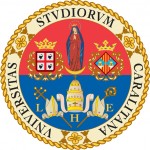Pharmacy
 General information and syllabus
General information and syllabus
Entry: restricted, via entry exam
Admissions: 95 + 4 non-Eu resident abroad + 1 assigned to Chinese citizens
Entry requirements: Italian upper secondary school leaving qualification or an equivalent foreign qualification, in accordance with norms in force.
Entry exam: 06/09/2010 – Cagliari
Knowledge required for entry: basic knowledge of physics, mathematics, chemistry and biology, logic and general knowledge.
Length of course: 5 years
Overall credits: 300 CFU
Specific educational goals:
The aim is to provide graduates with advanced scientific knowledge in the field of health and to form a professional expert in pharmaceuticals and their uses for therapeutic ends, able to act as a fundamental link between patient, doctor and public health institutions, collaborating in the monitoring of the pharmaceutical in the territory, in therapy implementation in both territorial and hospital fields and providing the patient and doctor with essential guidelines for the correct use of the drug. Graduates on the Master’s Degree course in Pharmacy are endowed with scientific basics and theoretical and practical expertise necessary to carry out the profession of pharmacist, and to operate as an expert in pharmaceuticals and health products (medical-surgical aids, health products, cosmetics, dietary products, herbal products, diagnostic and chemical-clinic products, etc.) in the medical health field.
Furthermore, during the course of studies, students must carry out a period of professional practical training of not less than six months (30 CFU credits) in a pharmacy open to the public and/ or hospital pharmacy.
In order to start the practical training period the student must have at least taken the Course in Technology, Socio-economics and Pharmaceutical Legislation 1 (in the fourth year).
Career opportunities for graduates:
Graduates with the Master’s Degree and the relative qualification for the profession of Pharmacist, may carry out the following professional activities:
– Preparation, control, storage and distribution of medicines to pharmacies open to the public and in hospitals;
– Storage, conservation and distribution of medicines in the wholesale commercial phase;
– Supply and control of medicines;
– Production and control of medicines;
– Quality control of medicines and health products in laboratories;
– Technical director of:
– Factories which produce medicaments, chemical substances used in medicine, medical equipment, infant and dietary foods;
– Factories which produce and package cosmetic products;
– Subsidiaries, warehouses and storage centres of chemical products used in medicines and of pharmaceutical preparations;
– Services connected with the production, safe storage and manipulation of toxic gases;
– Factories which produce food supplements, medicated supplements for animal feed, plant protection products etc;
– Authorised resellers of medicated supplements for zootechnics.
Graduates in Pharmacy may also carry out the profession of Chemist after passing the required state examination.
Syllabus
First year, first term
First year, second term
Second year, first term
Second year, second term
Third year, first term
Third year, second term
- Pharmaceutical and toxicological chemistry 1 and phytochemistry
- Pharmacognosy
- General pathology
- Medicine analysis 2
Fourth year, first term
- Pharmaceutical and toxicological chemistry 2
- Technology, socioeconomics and pharmaceutical legislation 1
Fourth year, second term
Fifth year, first term
- Cosmetic products
- Pharmacotherapy and phytotherapy
- Technology, socioeconomics and pharmaceutical legislation 2 and lab-based phytotherapic preparations
Fifth year, second term
